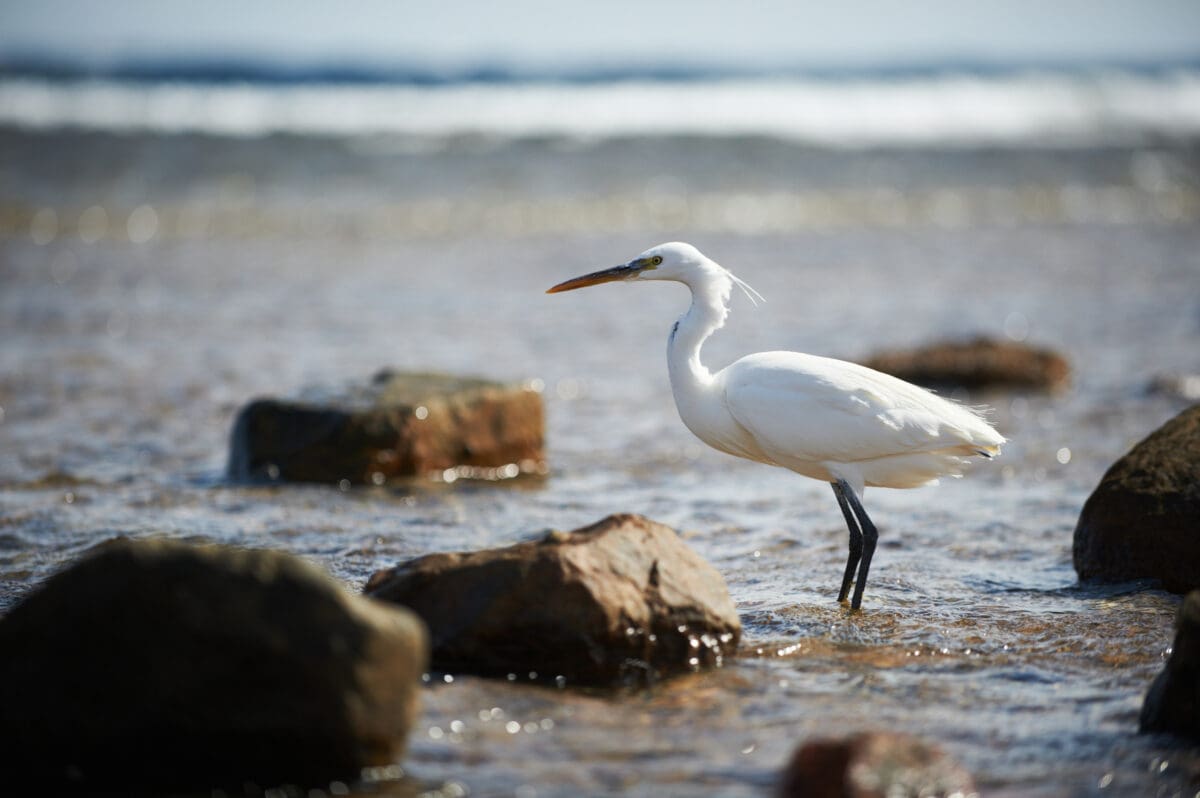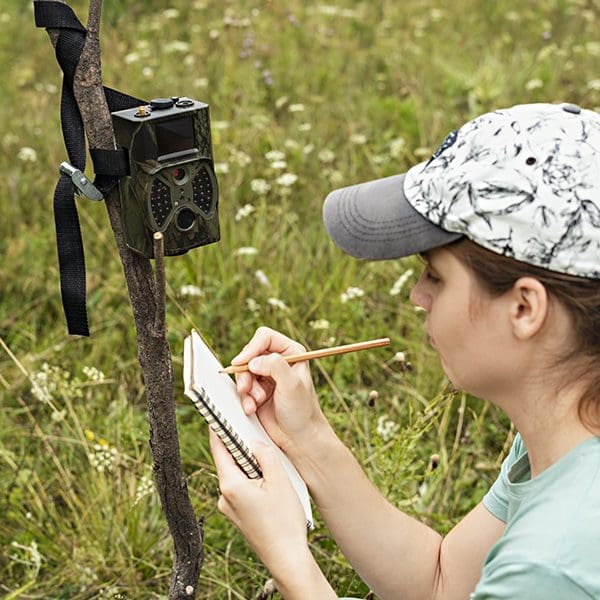
Wildlife Ecology and Management
Master of Professional Science
Explore a career that equips you
to manage ecosystems and safeguard wildlife.
Visualize gaining unparalleled ecological expertise, delving into the intricate dynamics of wildlife populations and habitats. With our MPS in Wildlife Ecology and Management, you’re not just studying wildlife; you’re actively contributing to their conservation, making a lasting difference in the natural world.
You’ll graduate ready to navigate the complexities of wildlife ecology, balancing the needs of diverse species with the demands of human communities and ecosystems. This approach ensures you’re not just a scholar but a problem solver, ready to address the evolving challenges in wildlife ecology and management.
Master technological applications in wildlife research, from GPS tracking to remote sensing. Acquire cutting-edge skills that make you a valuable asset in the field, contributing to the advancement of wildlife monitoring and conservation practices.
Enroll now and actively shape a career where every green skill learned propels you into a thriving job market.
Program Overview
The MPS in Wildlife Ecology and Management provides students with an advanced understanding of ecological concepts pertaining to wildlife management. Students study the latest scientific advances in wildlife ecology, conservation biology, landscape ecology, and research methodologies.
Through interactive coursework, students develop skills in spatial and quantitative analysis, conflict-resolution and decision-making, communication, and how to effectively engage with diverse audiences interested in wildlife conservation and management. The program prepares graduates to take on leadership roles in state and federal government agencies, conservation organizations, and research institutes to sustainably manage wildlife and their habitats, both locally and globally.
Prerequisites: Interested applicants in the Master’s in Wildlife Ecology and Management degree program must have completed 3 or more credits in Statistics, as well as 3 or more credits in either Ecology, Wildlife Biology, or Natural Resource Management.
Career Outlook
Earn your degree.
Unlock new opportunities.
Wildlife Biologist jobs in the U.S., 2021.
Wildlife Biologist pay, 2021.
Projected job openings per year for Wildlife Biologist through 2031.
Wildlife Biologist jobs in the U.S., 2021.
Wildlife Biologist pay, 2021.
Projected job openings per year for Wildlife Biologist through 2031.
*Source: U.S. Bureau of Labor Statistics. Unity Environmental University cannot guarantee employment. Salary data represents averaged earnings for the occupations listed and includes workers at all levels of education and experience.
Experiential and Immersive Coursework

Wildlife Ecology and Management
As the human population continues to grow, that growth has a direct impact on wildlife. Students act as members of a policy advisory or conservation affairs committee for a chapter of The Wildlife Society. The chapter has been approached by the state wildlife agency to provide recommendations as well as land management entities on how to respond to the chosen emerging wildlife management issue.

Conservation Ecology
Conservation challenges often arise and taking a transdisciplinary approach to solving those challenges is key. Students will play the role of a state biologist evaluating the status and habitat of a local threatened species under consideration for the endangered species listing process. Students will be required to investigate the biology, habitat requirements, and current viability of their target species, as well as the quality of the local habitat.

GIS and Remote Sensing for Environmental Solutions
Technology plays a large role in society, and it can also be used to solve real-world environmental problems. Students will analyze change over time of a terrestrial location, using Landsat imagery, Digital Elevation Models (DEM), and high-resolution aerial imagery among other GIS tools. Using data analysis and indice calculations to complete their final project, students gain practical, career-oriented, GIS skills.
Degree Requirements and Courses
The Master’s in Wildlife Ecology and Management degree requires 30 credits with a minimum 3.0 GPA. For a more comprehensive look into the program, view our full course catalog.
Frequently Asked Questions
-
What is Wildlife Ecology and Management
Wildlife Ecology and Management is all about understanding how animals interact with their environment and finding ways to protect them. In this program, you’ll dive deep into scientific advancements in wildlife ecology and conservation biology. Through hands-on courses, you’ll learn skills like analyzing data, solving conflicts, and communicating effectively about wildlife conservation. Whether it’s working for government agencies or conservation organizations, this program prepares you for leadership roles in protecting wildlife and their habitats. It’s not just about studying; it’s about gaining the tools to make a real difference in the world of wildlife.
-
What courses will I be taking?
Research Core: 15 credits
- PROF 505 Strategic Management of Innovation
- PROF 510 Communication for Environmental Professionals
- PROF 515 Ethical Practice and Policy
- PROF 590 Capstone I
- PROF 690 Capstone II
Major Program Core: 15 credits
- GISC 505 GIS and Remote Sensing for Environmental Solutions
- SNRM 507 Wildlife Ecology and Management
- SNRM 515 Conservation Ecology
- MATH 520 Quantitative Reasoning and Scientific Thought
- SNRM 510 Landscape Ecology
For course requirements and a better look into your program, view our full course catalog. Then apply online for free to get started.
-
How much does it cost?
Your online education should be affordable and manageable. Our team of distance education concierges will work with you through the admissions process to help you plan and pay for your degree. Learn more about the costs here.
-
How many credits can I transfer?
Apply online (it’s free!) and a distance education concierge will reach out to create an individualized plan for transferring your credits. We will consider up to nine transfer credits for our graduate programs.
-
How fast can I finish?
The timeframe for completion is up to you! Enroll in 6 credits per term and complete the program within just one year. Alternatively, opt for part-time study by taking one course at a time. Whichever path you choose, we’re here to support your educational journey every step of the way. Contact your concierge or advisor to create your personalized plan.
Program Features
Career Focus – Unity ranks in the top 15% of colleges for social mobility according to CollegeNET. Demand for employees with green skills is growing daily, and the sustainability core in every master’s program at Unity means that you’ll graduate with an environmental consciousness applicable to every career path.
Earn While You Learn – Our asynchronous model is designed to provide flexibility, allowing you to balance your studies with professional and personal commitments.
World Renowned Faculty – Learn from faculty who are working in their field, bringing their professional network and real-world insights into the virtual classroom, fostering valuable connections for your future career.
Applied Learning – You’ll be required to engage your local community and environment while completing your master’s degree, giving you practical, hands-on experience while allowing you to translate theoretical knowledge into real-world solutions.
Personalized Support – You can rely on one-on-one professional advising, career support from your first day, unlimited mental health counseling, and more.
Experts in the Field
At Unity Environmental University, our faculty is composed of a wide range of environmental science experts who in addition to teaching, conduct their own research and various fieldwork.

Brent Bibles
Professor of Wildlife Biology
Launch into the world of wildlife with Dr. Brent Bibles—a respected expert with a passion for wildlife management since the ’80s! Armed with a Ph.D. and M.S. in Wildlife and Fisheries Science, he’s not just an ornithologist but a dynamic force in all taxa.
Beyond academia, Dr. Bibles has collaborated with state wildlife and federal land agencies, working hands-on with endangered species like Mexican Spotted Owls and black-footed ferrets. As an exceptional teacher, he crafts courses fueled by questions, offering a unique blend of management experience, quantitative prowess, and a student-focused approach.
Ready to explore the wild side of academia? Join Dr. Bibles on a journey where education meets the untamed wilderness!
Faculty Profiles















